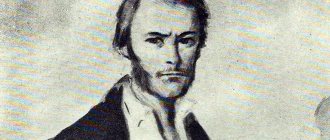Arkady: “A nihilist is a person who does not bow to any authority, who does not accept a single principle on faith, no matter how respectful this principle may be.”
***
Bazarov: “We act because of what we recognize as useful. In this day and age, the most useful thing is denial. We deny."
***
Bazarov: “Human moral illnesses come from the bad state of society. Correct society and there will be no diseases.”
***
“All people are the same, like trees in a forest. No botanist will study every single birch tree.”
***
“If you like a woman, try to make sense of her. It didn’t work out, well, move away - it’s not the light that has come together like a wedge.”
The image of Evgeny Bazarov in the novel “Fathers and Sons”: a description of the personality
Evgeny Bazarov is the main character of the famous novel “Fathers and Sons” by Turgenev.
***
". – Are you actually studying physics? – Pavel Petrovich asked in turn.
***
". I, the future doctor, and the doctor’s son, and the sexton’s grandson. After all, you know that I am the sexton’s grandson. Like Speransky. "
***
Evgeny himself does not consider himself a nobleman, although on his mother’s side he is a real nobleman:
***
“Your brother, a nobleman, cannot go further than noble humility or noble boiling, and this is nothing.” (Bazarov to Arkady)
***
". but people like him shouldn’t be measured by an ordinary yardstick, right. "
***
". The servants also became attached to him, although he made fun of them: they felt that he was still their brother, not a master. "
***
- ". Bazarov, who knew how to talk to men, did not even suspect that in their eyes he was still something of a fool. "
***
". “We act because of what we recognize as useful,” said Bazarov. – At the present time, the most useful thing is denial – we deny. "
***
". teasing as usual, he entered into a conversation with some man. "
***
". in my opinion, it is better to break stones on the pavement than to allow a woman to take possession of even the tip of a finger. "
***
- ". Are there any pretty women here? - asked Bazarov, finishing his third glass. "
***
". “Yes,” answered Bazarov, “a woman with a brain.” Well, she's seen the sights. "". After all, you despise us all. "(Odintsova to Bazarov about women)
***
Maria, disputes about Bazarov’s nobility have been going on for a long time. The novel does not contain precise information about Bazarov's nobility.
***
In various sources, Bazarov is called both a nobleman and a commoner. To support our version, we provide several quotes.
Table of Bazarov's views scientific philosophical economic political
Scientific and philosophical views:
“There are sciences, just as there are crafts, knowledge; and science doesn’t exist at all... Studying individual personalities is not worth the trouble. All people are similar to each other both in body and soul; each of us has the same brain, spleen, heart, and lungs; and the so-called moral qualities are the same for everyone: small modifications mean nothing. One human specimen is enough to judge all others. People are like trees in the forest; not a single botanist will study each individual birch tree.” “Each person hangs by a thread, an abyss can open up beneath him every minute, and he still comes up with all sorts of troubles for himself, ruining his life.” “Now we generally laugh at medicine and not at anyone.” We do not bow down."
Political Views:
“The only good thing about a Russian person is that he has a very bad opinion of himself...” “Aristocracy, liberalism, progress, principles... - just think, how many foreign and useless words! Russian people don’t need them for nothing. We act because of what we recognize as useful. At the present time, the most useful thing is denial - we deny... Everything...” “And then we realized that chatting, just chatting about our ulcers is not worth the effort, that it only leads to vulgarity and doctrinaire; we saw that our wise men, the so-called progressive people, and accusers are no good, that we are engaged in nonsense, talking about some kind of art, unconscious creativity, about parliamentarism, about the legal profession and God knows what, when it comes to the essentials bread, when the grossest superstition is strangling us, when all our joint-stock companies are bursting solely because there is a shortage of honest people, when the very freedom that the government is fussing about will hardly benefit us, because our peasant is happy to rob himself in order to get drunk in a tavern..." "Moral illnesses come from bad upbringing, from all sorts of trifles that people's heads have been stuffed with since childhood, from the ugly state of society, in a word. Correct society, and there will be no diseases... At least, with the correct structure of society, it will be completely indifferent whether a person is stupid or smart, evil or kind.” “And I hated this last man, Philip or Sidor, for whom I owe go out of his way and who won’t even say thank you to me... and why should I thank him? Well, he will live in a white hut, and a burdock will grow out of me, well, what then?”
Aesthetic views:
“A decent chemist is 20 times more useful than any poet.” “And nature is nothing in the sense in which you understand it. Nature is not a temple, but a workshop, and man is a worker in it...” “Raphael is not worth a penny...” “...On the third day, I see, he is reading Pushkin... Please explain to him that this is no good. After all, he is not a boy: it’s time to give up this nonsense. And I want to be a romantic nowadays! Give him something useful to read...” “Have mercy!” At 44 years old, a man, the father of a family, in ... the district - plays the cello! (Bazarov continued to laugh...).”
“Fathers and Sons” - quotes for essays
". This doctor’s son was not only not timid, he even answered abruptly and reluctantly, and there was something rude, almost impudent in the sound of his voice. "
***
- ". Everyone in the house got used to him, to his careless manners, to his unsyllabic and fragmentary speeches. "
***
". It was only then that the whole bottomless abyss of Bazarov’s pride was revealed to him for a moment. "
***
“Since I’ve been here, I’ve been feeling really bad, as if I’ve read Gogol’s letters to the Kaluga governor.”
***
“It is better to break stones on the pavement than to allow a woman to take even the tip of a finger.”
***
“You have no reason to get excited, I don’t care at all. A romantic would say: I feel that our paths are starting to diverge, but I’m just saying that we’re tired of each other.”
***
- “Like all women who failed to fall in love, she wanted something, without knowing what exactly. Actually, she didn’t want anything, although it seemed to her that she wanted everything.”
***
“In still waters. You know! You say she's cold. This is where the taste lies. You love ice cream, don't you?
***
". Bazarov's eyes sparkled for a moment from under his dark eyebrows. "
". He slowly ran his long fingers over his sideburns. "
Quotes from Arkady Kirsanov
• We should arrange our life in such a way that every day is significant.
• A maple leaf, when it falls to the ground, looks like a butterfly, and this is strange - because the driest and deadest is similar to the most cheerful and lively.
Source: moudrost.ru
To Pavel Petrovich’s question: “So you don’t recognize art?” - Bazarov exclaims with a grin: “The art of making money.” He speaks sharply negatively about poetry and poets: “A decent chemist is twenty times more useful than any poet,” he advises replacing Pushkin with the materialist Buchner, and calls the poet’s poems “nonsense.” About the greatest painter Rafael Bazarov says that he “is not worth a penny.” Turgenev's hero considers music a frivolous activity. In a conversation with Madame Odintsova, he openly admits: “You don’t assume artistic sense in me, but I really don’t have any.” What does Bazarov say about love? “Still, I will say that a man who put his whole life on the card of female love and when this card was killed for him, became limp and sank to the point that he was not capable of anything, such a person is not a man, not a male.” His other statement is equally surprising: “And what is this mysterious relationship between a man and a woman? We physiologists know what this relationship is. Study the anatomy of the eye: where does that mysterious look come from, as you say? This is all romanticism, nonsense, rot, art.” He puts the words “romanticism” and “rotten” on the same level; for him they are like synonyms.
“Such a rich body! At least now to the anatomical theater” - this is how Bazarov evaluates a wonderful specimen of “the same frog” - Odintsova. The attitude of the Kirsanov brothers towards Fenechka. Pavel Petrovich exclaims in delirium: “Oh, how I love this empty creature!” Bazarov loves differently. His views on women and love are sometimes called cynical. Is it so? In his attitude, for example, towards Fenechka there is more humanity and respect than in Pavel Petrovich’s absurd passion for her. “She’s a mother - well, she’s right” (Bazarov)
Arkady and Bazarov go to Odintsova’s estate for the first time on the day of the angel Evgeniy. It’s as if a new life is symbolically beginning for him. “Let’s see how he (the angel) takes care of me,” says Evgeniy. Thus, Odintsova appears in Bazarov’s life at the thought of an angel and leaves his life at the mention of an angel. When Anna Sergeevna comes to say goodbye to the dying Bazarov, Vasily Ivanovich exclaims: “Wife! Wife! ..an angel from heaven comes to us!” - and repeats: “Angel! Angel!" Having experienced a feeling of love, Evgeny looks out the window and feels the “irritable freshness of the night.” Irritable precisely because he feels it, but before he didn’t. This “infuriates and torments” him.
Source: literatura.neznaka.ru
Bazarov is a friend of Arkady Kirsanov:
“...Friend Arkasha, a very smart person, according to him...”
Bazarov's age is about 30 years. He is older than Arkady Kirsanov, who is 23 years old, and about the same age as Odintsova, who is 28 years old: “...we are both not in our first youth, especially me...” “...what do I need my youth for? I live alone, as a little boy..."
Appearance:
“...a tall man, in a long robe with tassels...” “...He slowly ran his long fingers over his sideburns...” “...Isn’t it true, what a glorious face he has?..” “...Long and thin, with a wide forehead, with a flat nose at the top, a pointed nose at the bottom, large greenish eyes and drooping sand-colored sideburns, it was enlivened by a calm smile and expressed self-confidence and intelligence...”
Bazarov is the son of a simple doctor: “...This doctor’s son was not only not timid, he even answered abruptly and reluctantly, and there was something rude, almost impudent in the sound of his voice...”
Origin:
“...My grandfather plowed the land,” Bazarov answered with arrogant pride...” Bazarov is not a nobleman. His mother is a hereditary noblewoman, but his father (the staff physician) is a non-hereditary nobleman: “...The estate is not his, but his mother’s; souls, I remember, fifteen..." "...I am a plebeian, homo novus - not one of the pillars, not like my missus..." (Bazarov's father about himself) Bazarov is a poor but proud man: "...I am a poor man, but I give alms I haven’t taken it yet..."
Bazarov is studying to become a doctor:
“...He wants to be a doctor next year...” “...Ah! He’s in the Faculty of Medicine...”
Bazarov is engaged in natural sciences:
“...His main subject is natural sciences. Yes, he knows everything...” “...he set to work on his frogs, ciliates, chemical compounds and kept fiddling with them...”
Bazarov is a self-confident person:
“...the face <...> expressed self-confidence and intelligence...” “...And I also thought <...> there is a task, because I am a giant!..”
Bazarov is a smart man:
“...Friend Arkasha, in his words, a very smart person...” “...the face <...> expressed <...> intelligence...”
Bazarov is a nihilist
by conviction: “...He is a nihilist <...> Who approaches everything from a critical point of view <...> A nihilist is a person who does not bow to any authority, who does not take any principle for granted, no matter how much respect he may have surrounded by this principle..." "...you do not recognize any authorities? Don't believe them? - But why would I recognize them? And what will I believe? They will tell me the case, I agree, that’s all...”
Bazarov is a rebel at heart:
“...No matter what passionate, sinful, rebellious heart hides in the grave...”
Bazarov is a simple man:
“...He is a wonderful fellow, so simple - you will see...” “... I felt in Bazarov the absence of everything noble, everything higher that both attracts and frightens...”
Bazarov does not like “ceremonies”:
“...The main thing is not to pay attention to him: he doesn’t like ceremonies...” “...Don’t you know yourself that the graceful side of life is inaccessible to me...” Bazarov does not dance at balls, unlike other people: “... Arkady danced poorly, as we already know, Bazarov didn’t dance at all...”
Bazarov - taciturn
and an ineloquent person. He doesn’t like to speak “beautifully”: “...Bazarov generally spoke little in the presence of the “old Kirsanovs” ...” “... I find that speaking beautifully is indecent...”
Bazarov is a cheeky person:
“...His aristocratic nature was outraged by Bazarov’s perfect swagger...”
Bazarov has casual manners:
“...Everyone in the house got used to him, to his careless manners, to his unsyllabic and fragmentary speeches...” “... having met his quick and careless gaze...”
Bazarov is a timid person:
“...This doctor’s son was not only not timid, he even answered abruptly and reluctantly...”
Bazarov is a mocking, ironic person:
“...Bazarov, who only occasionally inserted a mocking word into the conversation...” “...he immediately shook his head and ironically congratulated himself “on formally entering the celadons*” …” (*celadon - red tape)
Bazarov loves to joke and tease:
“...he came and, as usual, half-jokingly, half-yawning, sat with her...” “...It’s always advisable for you to joke,” Pavel Petrovich answered...” “...The servants also became attached to him, although he made fun of them...”
Bazarov is a proud person:
“...And what a disgusting pride,” Pavel Petrovich interrupted again...” “...it was only then that the whole bottomless abyss of Bazarov’s pride was revealed to him for a moment...”
Bazarov is a calm, phlegmatic man:
“...That’s it,” Bazarov repeated with inexpressible calm. “... Bazarov noted phlegmatically...”
Bazarov is an arrogant person:
“...Bazarov straightened up arrogantly...” “... Bazarov answered with arrogant pride...”
Bazarov is a cynic
(according to Pavel Petrovich): “...Pavel Petrovich <...> considered him proud, impudent, cynic, plebeian...”
Bazarov is a arrogant person: “... we don’t have that daring arrogance...”
Bazarov is critical of everything:
“...I don’t share anyone’s opinions; I have my own..." "...You are a dangerous gentleman; you’re such a critic...” “...I’m pleased to deny, my brain is designed that way - and that’s it!..”
Bazarov is a contemptuous person:
"…Alas! shrugging his shoulder contemptuously..." "...exclaimed Bazarov with a contemptuous grin...”
Bazarov is a cold person:
“...Bazarov, even here, remained cold as ice...” “... A cold smile curled Bazarov’s lips...”
Bazarov is a cold-blooded person:
“...What, is he always like this with you? - Bazarov calmly asked Arkady...” “...The city is like a city,” Bazarov noted coolly...”
Bazarov is a “predatory”, aggressive person:
“...He is predatory, and you and I are tame <...> Your friend doesn’t want this, but he has it in him...” “...we want to fight...” “...it’s boring for us - give us others! We need to break others!..”
Bazarov is an energetic, active person:
“...in his still energetic figure...” Bazarov is a harsh person: “...She liked Bazarov - for his lack of coquetry and the very sharpness of his judgments...” “...Listen, Evgeny, you’ve already treated him too harshly,” Arkady noted. “You insulted him...” Bazarov can be strict with people: “...You are strict today, Evgeny Vasilich...”
Bazarov is a firm, tough person:
“...you must agree, although I am not a soft creature...” “...many even condemn him for such firmness of his character and see in it a sign of pride or insensitivity...”
Bazarov does not recognize art:
“...You don’t recognize art, then?..” “...you don’t assume artistic meaning in me - yes, I really don’t have it in me...”
Bazarov is indifferent to nature:
“...Katya adored nature <...> Odintsova was rather indifferent to her, just like Bazarov...”
Bazarov does not bow to anything:
“...we now generally <...> do not bow to anyone...”
Bazarov laughs at modern medicine:
“...we generally laugh at medicine now...” “...Even though you laugh at medicine, I’m sure you can give me good advice...”
Bazarov does not believe in romantic love:
“... love... after all, this is a feigned feeling...” “... but love in the ideal, or, as he put it, romantic, sense, he called rubbish, unforgivable foolishness, considered knightly feelings something like ugliness or illness...”
Bazarov does not like romance:
“...And you want to be a romantic at the present time!..” “...A decent chemist is twenty times more useful than any poet,” interrupted Bazarov...
Bazarov does not believe in marriage:
“...You still attach importance to marriage; I didn’t expect this from you...” (Bazarov to Arkady)
Bazarov is a strong-willed person:
“... Every person must educate himself - well, at least like me, for example...” “... sometimes it is useful for a person to take himself by the crest and pull himself out, like a radish from a ridge; I did this the other day..."
Bazarov gets up early:
“...he usually gets up early and goes somewhere...”
Bazarov is a hardworking person:
“...Arkady was sybaritic, Bazarov worked...” “...Bazarov worked stubbornly and gloomily...”
Bazarov is a good doctor:
“...In her eyes, he and the doctor were excellent...” “... Pavel Petrovich was already lying in bed with his leg skillfully bandaged...”
Bazarov easily communicates with people who are lower in status than him:
“...Bazarov, who had a special ability to arouse trust in himself in lower people, although he never indulged them and treated them carelessly...”
Bazarov is an honest, straightforward person:
“...Bazarov announced his departure to her not with the idea of testing her, to see what would come of it: he never “made up things.”
Bazarov is a modest person:
“...You are very modest...” (Odintsova about Bazarov) “...I don’t know, I don’t want to brag...”
Bazarov is an unusual, extraordinary person:
“...you are not an ordinary person...” “... no one would blame Bazarov for vulgarity...” (not vulgar - that is, extraordinary)
Bazarov does not want to be a nonentity:
“...my parents <...> don’t worry about their own insignificance, it doesn’t stink to them... but I... I only feel boredom and anger...”
Bazarov does not like to talk about feelings:
“...excuse me... I’m not used to speaking out at all...” “...I don’t dare show my feelings in front of him, because he doesn’t like it. He is the enemy of all outpourings..." (Father Bazarov about his son)
Bazarov is a selfless person:
“...He is a disinterested, honest person,” Arkady noted...”
Bazarov is a conscientious person:
“...Yes, and I’m ashamed to somehow shut myself out from him...”
Bazarov is a kind person at heart:
“...how can I thank you; You’re so kind, really...” (Fenechka’s opinion)
Bazarov appreciates female beauty:
“...Bazarov was a great hunter of women and female beauty...” At the same time, Bazarov does not respect women and calls them “women”: “...What kind of figure is this? - he said. “She’s not like other women...” (about Madame Odintsova) “...” Here’s to you! the woman was scared!..." Bazarov believes that beautiful women do not need to be smart: "...according to my observations, only freaks think freely between women..."
Bazarov dies
at a young age from contracting a fatal infection - typhus: “...Today I went to the village, you know, where they brought a typhoid man from. For some reason they were going to open it up <...> Well, so I asked the district doctor; Well, I cut myself...” “...If I got infected, it’s too late now...”
Source: studopedia.ru
Aphorisms about nihilism
“As for time, why will I depend on it? It’s better to let it depend on me.”
***
“When I meet a person who would not give up in front of me, then I will change my opinion about myself.”
***
- “There was an empty space in the suitcase, and I put hay in it; It’s the same in our life’s suitcase: no matter what they fill it with, as long as there is no emptiness.”
***
“A person is able to understand everything, how the ether trembles and what happens in the sun; but how a person can blow his nose differently than himself, he is not able to understand this.”
***
“A real person is not one about whom there is nothing to think, but whom one must obey or hate.”
***
". Our man is happy to rob himself just to get drunk on dope in a tavern. "
***
“Every person hangs by a thread, an abyss can unfold beneath him every minute, and yet he invents all sorts of troubles for himself, ruining his life.”
Literature lesson on the topic “Bazarov’s Nihilism”
The clash of the “civilizing impulse with the order of culture” (Bazarov’s nihilism and the views of the “guardian of traditions” P.P. Kirsanov)
Teacher's opening speech.
— The topic of today’s lesson is “Nihilism and its consequences.” Today we will try to find out more deeply what is hidden under the frightening word “nihilism”; we will talk about the beliefs of Yevgeny Bazarov, the hero of I. S. Turgenev’s novel “Fathers and Sons”. Let’s try to answer the question: “Does a person’s fate depend on his beliefs? Can beliefs destroy a person, destroy his life, or, conversely, make him happy?
In preparation for the lesson, you guys had to re-read certain chapters of the novel “Fathers and Sons” and complete some tasks.
2. We have vocabulary work to do.
Let's see how the same concept of “nihilism” is revealed in different sources. (Reading the wording of the definitions of nihilism given in the Big Encyclopedic Dictionary, V. Dahl’s Dictionary, Explanatory Dictionary and Encyclopedia Britannica.)
— NIHILISM (from Latin nihil - “nothing”) - denial of generally accepted values: ideals, moral standards, culture, forms of social life. Large encyclopedic dictionary
- NIHILISM - “an ugly and immoral doctrine that rejects everything that cannot be touched.” V.Dal
- NIHILISM - “naked denial of everything, logically unjustified skepticism.” Explanatory dictionary of the Russian language
- NIHILISM - “the philosophy of skepticism, the denial of all forms of aesthetics.” Social sciences and classical philosophical systems were completely denied, and any power of the state, church, or family was denied. Science for nihilism has become a panacea for all social problems. Britannica
- What did you notice?
— It is interesting to note that different sources give their own version of the interpretation of this concept and its origin. The Encyclopedia Britannica traces its history back to the Middle Ages. Modern researchers date it back to the beginning of the 19th century. Some publications believe that the concept of nihilism was first defined by the German philosopher Friedrich Nietzsche. “What does nihilism mean? - he asks and answers: - That the highest values lose their value... there is no goal, there is no answer to the question “why?”
The history of the word “nihilist” in Russia is interesting.
Student message:
— The word “nihilist” has a complex history. It appeared in print in the late 20s. XIX century And at first this word was used in relation to ignoramuses who do not know anything and do not want to know. Later, in the 40s, the word “nihilist” began to be used as an expletive by reactionaries, calling their ideological enemies – materialists, revolutionaries – as such. Progressive figures did not abandon this name, but put their own meaning into it. Herzen argued that nihilism means the awakening of critical thought, the desire for accurate scientific knowledge.
— So, is nihilism beliefs or the lack thereof? Can nihilism be considered a socially positive phenomenon? Why?
— Nihilism is a belief that is rigid and unyielding, based on the denial of all previous experience of human thought, on the destruction of traditions. The philosophy of nihilism cannot be positive, because... rejects everything without offering anything in return. Nihilism arises where life is devalued, where the goal is lost and there is no answer to the question about the meaning of life, about the meaning of the existence of the world itself.
3. I.S. Turgenev in his famous novel “Fathers and Sons” outlined in a publicly accessible form the idea of nihilism through the mouth of the character Evgeny Bazarov.
Let's remember Bazarov's views. At home you had to fill out the table by selecting quotes from the novel (reading the quotes and discussing them).
Scientific and philosophical views:
- “There are sciences, just as there are crafts and knowledge; and science doesn’t exist at all... Studying individual personalities is not worth the trouble. All people are similar to each other both in body and soul; each of us has the same brain, spleen, heart, and lungs; and the so-called moral qualities are the same for everyone: small modifications mean nothing. One human specimen is enough to judge all others. People are like trees in the forest; not a single botanist will study each individual birch tree.”
- “Every person hangs by a thread, an abyss can open up beneath him every minute, and yet he invents all sorts of troubles for himself, ruining his life.”
- “Now we generally laugh at medicine and do not bow to anyone.”
Political Views:
- “The only good thing about a Russian person is that he has a very bad opinion of himself...”
- “Aristocracy, liberalism, progress, principles... - just think, how many foreign and useless words! Russian people don’t need them for nothing. We act because of what we recognize as useful. At the present time, the most useful thing is denial - we deny... Everything..."
- “And then we realized that chatting, just chatting about our ulcers, is not worth the effort, that it only leads to vulgarity and doctrinaire; we saw that our wise men, the so-called progressive people, and accusers are no good, that we are engaged in nonsense, talking about some kind of art, unconscious creativity, about parliamentarism, about the legal profession and God knows what, when it comes to the essentials bread, when the grossest superstition is strangling us, when all our joint-stock companies are bursting solely because there is a shortage of honest people, when the very freedom that the government is fussing about will hardly benefit us, because our peasant is happy to rob himself in order to get drunk in a tavern..."
- “Moral illnesses come from bad upbringing, from all sorts of trifles that people’s heads have been stuffed with since childhood, from the ugly state of society, in a word. Correct society, and there will be no diseases... At least, with the correct structure of society, it will be completely indifferent whether a person is stupid or smart, evil or kind.”
- “And I hated this last guy, Philip or Sidor, for whom I have to go out of my way and who won’t even say thank you to me... and why should I thank him? Well, he will live in a white hut, and a burdock will grow out of me, well, what then?”
Aesthetic views:
- “A decent chemist is 20 times more useful than any poet.”
- “And nature is trifle in the sense in which you understand it. Nature is not a temple, but a workshop, and man is a worker in it..."
- “Raphael is not worth a dime...”
- “...The day before yesterday, I see he’s reading Pushkin... Please explain to him that this is no good. After all, he is not a boy: it’s time to give up this nonsense. And I want to be a romantic nowadays! Give him something useful to read..."
- “Have mercy!” At 44 years old, a man, the father of a family, in ... the district - plays the cello! (Bazarov continued to laugh...)"
— Do Bazarov’s views correspond to nihilistic views, or was Turgenev mistaken in classifying him as a nihilist?
— Bazarov’s views are fully consistent with nihilistic views. Denial, reaching the point of absurdity, of everything and everyone: moral laws, music, poetry, love, family; an attempt to explain all phenomena of reality, even inexplicable ones, with the help of scientific research, materialistically.
—What do the heroes of the novel “Fathers and Sons” say about nihilists?
Nikolai Petrovich Kirsanov says that a nihilist is a person “who does not recognize anything.” Pavel Petrovich adds, “who doesn’t respect anything.” Arkady: “who approaches everything from a critical point of view, does not bow to any authorities, does not accept a single principle on faith, no matter how respectful this principle may be.”
- Which of the 3 interpretations is more suitable for Bazarov’s nihilism?
And what does Bazarov admit? (science, the huge role of self-education, labor, work)
- Is it good or bad to look at everything from a critical point of view?
- Looking at everything critically, you can find shortcomings, mistakes, and correct them. Doubt and denial have always been the engine of scientific and social progress. Everything new is built on the basis of the negation of the old. But you can’t blindly deny everything, you can’t give up positive experience, traditions. There must be a new positive program. What do you offer in return, in what ways?
— Bazarov was critical of serfdom, autocracy, the state system in general, religion, laws, and traditions. Bazarov is going to “clear the place”, i.e. break the old.
—What are people called who break the old system?
- Revolutionaries.
- So, Bazarov is a revolutionary in his views. Turgenev wrote: “...and if he is called a nihilist, then he must be read as a revolutionary.” Now tell me, in the name of what are they breaking the old? For what?
- To build a new one - better than the old one.
So what is Bazarov going to build?
Nothing. He says it's none of his business. His job is to clear the place, and that’s all.
What is good and what is bad in Bazarov’s program?
It's good that he sees the shortcomings of modern society. It’s bad that he doesn’t know what to build and doesn’t intend to build it. He has no creative program.
How does Turgenev feel about Bazarov’s beliefs? Does he separate them?
The author does not share Bazarov’s nihilistic beliefs; on the contrary, he consistently debunks them throughout the course of the novel. From his point of view, nihilism is doomed, because has no positive program.
Turgenev is a liberal by his worldview and an aristocrat by origin. How could he make his opponent better and let him win?
— Perhaps you will find the answer to this question in the statement of Turgenev himself: “To accurately and powerfully reproduce the truth, the reality of life is the highest happiness for a writer, even if this truth does not coincide with his own sympathies.”
According to these words of Turgenev, it turns out that the image of Bazarov is an objective truth, although it contradicts the author’s sympathies.
- How do you feel about Bazarov? Why does Turgenev write about his hero like this: “If the reader does not love Bazarov with all his rudeness, heartlessness, ruthless dryness and harshness, if he does not love him, then I am guilty and have not achieved my goal.”
— Turgenev is a great psychologist. His Bazarov, although cynical and shameless in words, is a moral man at heart. In Bazarov there is hidden much of what he denies: the ability to love, romanticism, the origin of the people, family happiness, and the ability to appreciate beauty and poetry. (In moments of despair, he wanders through the forest, before a duel he notices the beauty of nature; trying to hide his embarrassment, he behaves cheekily; duel).
- Why didn’t Bazarov refuse to participate in the duel?
Pavel Petrovich threatened to hit him with a stick if he refused. So what? A person who sincerely does not recognize any conventions can afford not to care about public opinion. Bazarov is much younger than Pavel Petrovich and would hardly allow himself to be beaten. But he was afraid of something else - shame. And this proves that far from everything he spoke about with a contemptuous grin, he was truly indifferent.
Without realizing it himself, Bazarov lives by fairly high moral principles. But these principles and nihilism are incompatible. Something will have to be given up. Bazarov as a nihilist and Bazarov as a person fight among themselves in their souls.
— Do you think a person’s beliefs affect his destiny?
— The hero’s beliefs, which he consistently puts into practice, cannot but affect his fate. They model his fate. And it turns out that a strong and powerful person, before whom no one has ever given up, who denies romanticism, trusts his ideas so much that just the thought of a mistake makes him despondent, into a state of depression. For this he will be terribly punished: medical studies will prove fatal for him, and medicine, which he revered so much, will not be able to save him. The logic of the novel forces us to see in Bazarov’s death the triumph of the forces of common sense, the triumph of life.
4. Consequences of nihilism.
— Can you give examples of nihilism in the history of our country?
— I want to read the lines from the manifesto “A Slap in the Face of Public Taste”:
These words were written in 1912. Below them are the signatures of several poets, including V. Mayakovsky.
The authors of the manifesto called themselves futurists, from lat. futurum - future. They despised society and its laws, old literature with its traditions, generally accepted rules of behavior, principles, and authorities. They performed reading their strange, rough, wild poems, appeared before the public dressed provocatively, with painted faces, they constantly mocked readers and listeners, were rude to them, showing them how they despised the well-fed, prosperous world. They tried to crush even language and made daring experiments on the poetic word.
It seems to me that these people are like nihilists.
— We will talk about futurists in detail next year. What kind of movement is this, what did it bring to literature? But I want to note that V. Mayakovsky joined the futurists only in his very early work. And later his views were no longer so extreme. Moreover, he wrote poems in which he talks with Pushkin about the purpose of a poet and poetry.
There was a similar period in the history of our country after the Great October Socialist Revolution, when some artists decided to abandon all previous experience and create a new proletarian culture from scratch.
It is to this period that Boris Zaitsev’s opinion, taken as an epigraph to our lesson, dates back to: “Turgenev’s heart could not be with the first Bolshevik in our literature.”
Boris Zaitsev lived a long life. He observed the flourishing of the Silver Age culture, and then the split of the world, the destruction of the society in which he lived and worked, the extermination of culture and civilization. A forced emigrant who lived abroad for the rest of his life, an excellent connoisseur of classical literature, he had the right to see in Bazarov’s nihilism the militant nihilism of the Bolshevik and to connect all the events that happened half a century later with the ideas that Bazarov preached.
— Nowadays they talk and write a lot about the impending environmental disaster. Many species of animals and plants disappeared. The ozone layer is decreasing. In big cities there is not enough drinking water. Various disasters occur in different parts of the planet: earthquakes, floods, global warming. You ask, what does nihilism have to do with it? Let us remember Bazarov’s phrase: “Nature is not a temple, but a workshop.” Over the years, man has truly treated nature as a workshop. He comes up with new high technologies, uses the latest achievements of chemistry, physics, and genetic engineering. And at the same time, he does not think that the waste of these high technologies, all kinds of experiments cause great harm to nature and man himself. And we must treat nature first of all as a temple, and then as a workshop.
The problem of dialogue between man and nature is a universal human problem. It was constantly considered by Russian literature of both the 19th and 20th centuries. Let's now listen to a poem by Robert Rozhdestvensky. Written in the 1970s, it unfortunately remains relevant today.
***
We shred the ice, change the flow of rivers, We repeat that there is too much to do... But we will still come to ask for forgiveness From these rivers, dunes and swamps, From the gigantic sunrise, From the smallest fry... I don’t want to think about it yet. Now we have no time for that. Bye. Airfields, piers and platforms, Forests without birds and land without water... Less and less of the surrounding nature, More and more of the environment.
Yes, there is less and less living nature around us, more and more zones unsuitable for human habitation: the Chernobyl zone, the Aral zone, the Semipalatinsk zone... And this is the result of a thoughtless invasion of the natural world by scientific and technological progress.
- So, is nihilism a disease or a cure for diseases?
Nihilism is a disease very familiar to our country, which has brought troubles, suffering, and death. It turns out that Bazarov is a hero of all times and peoples, born in any country where there is no social justice and prosperity. Nihilistic philosophy is untenable because... she, denying spiritual life, denies moral principles. Love, nature, art are not just lofty words. These are the fundamental concepts underlying human morality.
We must understand that there are values in the world that cannot be denied. A person should not rebel against those laws that are not determined by him, but dictated...Whether by God, or by nature - who knows? They are immutable. This is the law of love for life and love for people, the law of the pursuit of happiness and the law of enjoying beauty...
Let our lesson today end with the final lines of Turgenev’s novel. Let them sound like a hymn glorifying nature, love, life!
“Isn’t love, holy, devoted love, omnipotent? Oh no! No matter what passionate, sinful, rebellious heart hides in the grave, the flowers growing on it serenely look at us with their innocent eyes: they tell us not only about eternal peace, about that great peace of “indifferent” nature; they also talk about eternal reconciliation and endless life..."
Bazarov's quotes about nature
- “Flying fish can stay in the air for a while, but soon they must splash into the water.”
“A maple leaf, when it falls to the ground, looks like a butterfly, and this is strange because the driest and deadest is similar to the most cheerful and lively.”
***
“There must be something special, some kind of vanity, in the feeling of a person who knows and says that he is poor.”
***
. And he looked around, as if wanting to understand how one could not sympathize with nature. "
***
“Personality, dear sir, is the main thing; The human personality must be as strong as a rock, for everything is built on it.”
***
“They [the Russian people] sacredly honor traditions, they are patriarchal, they cannot live without faith.”
***
“Without self-esteem, without self-respect - and in an aristocrat these feelings are developed - there is no solid foundation. public building. "
Dispute about principles (views of Bazarov and Pavel Petrovich Kirsanov)
Svetlana Berestovitskaya » Lesson materials » Literature » Dispute about principles (views of Bazarov and Pavel Petrovich Kirsanov)
Dispute about principles (views of Bazarov and Pavel Petrovich Kirsanov)
comparison table
| Pavel Petrovich Kirsanov | Evgeny Bazarov | |
| 1. Appearance, behavior style | ||
| Fit, sophistication, aristocracy. “The whole appearance of Arkadiev’s uncle is elegant. Thoroughbred, retained his youthful slimness...” “Pavel Petrovich took his beautiful hand with long pink nails out of the pocket of his trousers...” “He has such amazing collars, like stone ones, and his chin is so neatly shaved...” | Cheekiness, carelessness, rudeness. “Evgeny Vasiliev,” answered Bazarov in a lazy but courageous voice and, turning away the collar of his robe, showed Nikolai Petrovich his whole face. Long and thin, with a wide forehead, a flat nose at the top, a pointed nose at the bottom, large greenish eyes and drooping sand-colored sideburns, it was enlivened by a smile and expressed self-confidence and intelligence.” | |
| 2. Socio-political views | ||
| Liberal, aristocrat. “... everyone knows me as a liberal person who loves progress...” “... without self-esteem, without self-respect, and in an aristocrat these feelings are developed, there is no solid foundation for a social building. Personality... that’s the main thing.” | Nihilist. Arkady: “A nihilist is a person who does not bow to any authority, who does not accept a single principle on faith, no matter how respectful this principle may be.” Bazarov: “We act because of what we recognize as useful. In this day and age, the most useful thing is denial. We deny." Space clearing theory. Arkady: “We break because we are strong. ... Strength never gives an account.” Bazarov: “Human moral illnesses come from the bad state of society. Correct society and there will be no diseases.” | |
| 3. Attitude towards the people | ||
| “...he, by the way, always stands up for the peasants; True, when talking to them, he winces and sniffs cologne.” | “My grandfather plowed the land,” Bazarov answered with arrogant pride. And at the same time he despises the people. | |
| 4. Philosophical views | ||
| Believes in God | Materialist “... the important thing is that two and two make four, and the rest is nothing.” Doesn't recognize philosophy “All people are the same, like trees in a forest. No botanist will study every single birch tree.” | |
| 5. Life credo | ||
| “Aristocracy is a principle, and in our time only immoral or empty people can live without principles.” | “There are no principles at all, but only sensations.” “A real person is one who must be obeyed or hated.” | |
| 6. Aesthetic views | ||
| He defends art, but is indifferent to it. “Pavel Petrovich reached the end of the garden and also began to think, and also raised his eyes to the sky. But his beautiful dark eyes reflected nothing but the light of the stars. He was not born a romantic, and his foppishly dry and passionate... soul did not know how to dream.” | Denies art, poetry, the aesthetic side of life. “A decent chemist is twenty times more useful than any poet.” “Raphael is not worth a penny.” “Nature is not a temple, but a workshop...” “I find it. What to say beautifully is indecent.” | |
| 7. Attitude towards a woman, love | ||
| The attitude towards a woman is reverent, respectful, love is chivalrous, noble, pure. | Denies love “And what is this mystery about the relationship between a man and a woman? We physiologists know what this relationship is. Just study the anatomy of the eye, where does that mysterious look come from? This is all romanticism, nonsense, rot, art. Let’s go and look at the frogs.” “If you like a woman, try to make sense of her. It didn’t work out, well, move away - it’s not the light that has come together like a wedge.” “Such a rich body, even now to the anatomical theater.” | |
Return to list
Quotes about generation gap
“We cannot understand each other; At least I don’t have the honor of understanding you.” — Kirsanov P. P.
***
“We, people of the old century, believe that there are no principles. You can’t take a step, you can’t breathe.” — Kirsanov P. P.
***
“The young people were happy. And in fact, before they were just idiots, but now they suddenly became nihilists.” — Kirsanov P. P.
***
“You deny everything, or, to put it more precisely, you destroy everything. But you also need to build.” — Kirsanov N.P.
***
“Man is a strange creature. When you look from the side and from a distance at the deaf life that the “fathers” lead here, it seems: what’s better?” — E. Bazarov








